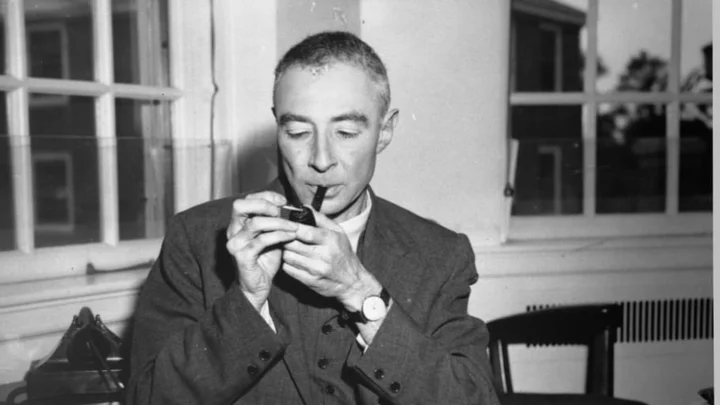He directed the laboratory that built and successfully tested the first atomic bomb. Then, once it became possible for mankind to build an even more dangerous weapon, he became an outspoken critic of the nuclear arms race and was put on trial by the very government he once served. Here are 10 essential facts about Julius Robert Oppenheimer, the enigmatic physicist at the center of Christopher Nolan's newest film.
1. When he was 12 years old, J. Robert Oppenheimer was invited to give a lecture on geology.
Oppenheimer majored in chemistry as a Harvard undergrad and later made a name for himself as a physicist, but rocks and minerals were his first scientific love. Born in New York City on April 22, 1902, he used to collect rock samples in Manhattan and the Hudson River Palisades as a boy.
“By the age of 12, he was using the family typewriter to correspond with a number of well-known geologists about the rock formations he had studied in Central Park. Not aware of his youth, one of these correspondents nominated Robert for membership in the New York Mineralogical Club, and soon thereafter a letter arrived inviting him to deliver a lecture before the club,” write biographers Kai Bird and Martin J. Sherwin in their book, American Prometheus: The Triumph and Tragedy of J. Robert Oppenheimer. Encouraged by his parents, young Oppenheimer gave the speech and got a round of applause for his efforts, though he needed to stand on a box in order to see over the podium.
2. He also studied cosmic rays.
NASA describes cosmic rays as a “puzzling form of radiation” that consist of “electrically charged, subatomic particles that crash into our atmosphere, where they are broken up and fall to Earth in even smaller fragments.” You might say Oppenheimer was an early fan. In 1931 he and a student named Frank Carlson co-wrote the first of many scientific papers about the physics of cosmic rays—a relatively new phenomenon that had only been discovered in 1912, less than 20 years earlier.
3. Oppenheimer helped family members escape Nazi Germany.
Oppenheimer hailed from a (non-observant) German Jewish family. In 1937, he used his own money to sponsor his Aunt Hedwig and her son Alfred—plus Alfred’s family—when they fled their home to come stateside after Hitler rose to power.
4. The first atomic weapons were developed under his leadership at the Los Alamos National Laboratory.
The physicist was just 38 years old in 1943, when General Leslie R. Groves chose him to direct the Los Alamos National Laboratory (LANL) in New Mexico. On paper, he was an unlikely candidate for the job. Yes, Oppenheimer had already received his Ph.D. and was teaching at the University of California, Berkeley at the time. But as the National Parks Service website points out, the “thin, chain-smoking Oppenheimer was ‘eccentric’ by his own admission, had relatively little administrative experience, had not won a Nobel Prize, and had relatives who were suspected of being Communist sympathizers.”
Nevertheless, he soon proved his mettle. The Los Alamos team’s core objective was the top-secret Manhattan Project, a secret campaign to invent the first nuclear weapons. Oppenheimer managed everything from the salaries to the living quarters at the LANL, and had a real talent for settling disagreements that flared up between scientists and military personnel connected to the Manhattan Project. It was at this New Mexico lab that Oppenheimer earned the nickname “Father of the Atomic Bomb.”
5. He wrote poetry.
Privately, Oppenheimer said his material wasn’t “meant or fit for anyone’s perusal,” but he had a passion for verse and creative writing. One of his poems, a somber meditation titled “Crossing” even appeared in an issue of the Harvard literary magazine, Hound & Horn. Here’s how that one goes:
“It was evening when we came to the river with a low moon over the desert that we had lost in the mountains, forgotten, what with the cold and the sweating and the ranges barring the sky.
“And when we found it again, in the dry hills down by the river, half withered, we had the hot winds against us.
“There were two palms by the landing; the yuccas were flowering; there was a light on the far shore, and tamarisks.
“We waited a long time, in silence.
Then we heard the oars creaking and afterwards, I remember, the boatman called to us.
We did not look back at the mountains.”
6. Oppenheimer’s mind turned to the Bhagavad Gita as he watched the first nuclear bomb explode.
Oppenheimer couldn’t help but think of the Bhagavad Gita, a sacred Hindu text which recounts a conversation between a human prince and the god Vishnu on the eve of a great battle, on July 16, 1945—the day of the infamous Trinity Nuclear Test. At 5:29 a.m. (Mountain Time), the LANL staff made history by becoming the first people to successfully detonate an atomic bomb.
Oppenheimer famously quoted the Bhagavad Gita in a 1965 TV documentary when he reflected on the test, and how it made him feel. It’s arguably the best-known comment he ever made, and an eerie testament to the world-changing power his team unleashed at Los Alamos:
“We knew the world would not be the same. A few people laughed, a few people cried. Most people were silent. I remembered the line from the Hindu scripture, the Bhagavad Gita; Vishnu is trying to persuade the Prince that he should do his duty and, to impress him, takes on his multi-armed form and says, ‘Now I am become Death, the destroyer of worlds.’ I suppose we all felt that, one way or another.”
7. After World War II, Oppenheimer became an opponent of the hydrogen bomb.
In 1949, four years after Trinity, the Soviet Union tested a nuclear bomb of their own. The device worked, threatening to alter the balance of power in the Cold War. Not wanting to lose ground in the arms race, President Harry S Truman signed off on the development of an experimental new weapon, one that would become even more devastating than its predecessor: the hydrogen bomb.
Oppenheimer was very much against it. Since 1946, he had been involved with the General Advisory Committee (GAC) to the U.S. Atomic Energy Commission. Following that Soviet nuclear test, Oppenheimer led a GAC discussion panel about the ethics and feasibility of H-bomb research.
“The committee concluded that it shouldn’t be built because this was a weapon of genocide that had absolutely no military necessity, and that our stockpile of atomic bombs was a sufficient deterrent,” biographer Martin J. Sherwin said in The Trials of J. Robert Oppenheimer, a 2008 PBS documentary.
Nevertheless, the United States ultimately went ahead with the project. America conducted its first successful hydrogen bomb test on November 1, 1952, over the Marshall Islands in the Pacific. The explosion released around 1000 times more energy than the bomb dropped on Hiroshima, Japan had in 1945.
8. Oppenheimer’s security credentials were eventually revoked because he was considered a “security risk.”
By the 1950s, there were concerns that the Soviets had stolen American nuclear secrets—and that didn’t bode well for Oppenheimer. The physicist had befriended a number of avowed communists over the years, though historians aren’t sure if he ever joined their party himself. And then there was the hydrogen bomb issue: Some of Oppenheimer’s political enemies, including fellow scientist Edward Teller, thought his opposition to the H bomb was unpatriotic at best.
“Teller sincerely believed that we were in a dangerous arms race with the Russians, and that Oppenheimer was standing in the way of protecting the country against this dreaded foe,” said physicist Marvin Goldberg in The Trials of J. Robert Oppenheimer.
On December 21, 1953, Oppenheimer received a letter from the chair of the Atomic Energy Commission telling him that he’d been labeled a security risk. Though he came under pressure to resign from the GAC, Oppenheimer pushed for a hearing instead—and he got one.
Right from the start, the court case stood on uneven ground. “The defense suffered from a lack of access: none of Oppenheimer’s defense team had security clearance, and therefore they could not see pivotal documents, including information from Oppenheimer’s FBI file and some of his own writings, that the prosecution had access to. Oppenheimer served as the defense’s memory, but frequently censored himself, out of a fear of unintentionally spilling classified information,” according to the Atomic Heritage Foundation website.
Although the panel that decided his fate conceded that he’d been a “loyal citizen,” they voted to revoke Oppenheimer’s security clearance—a decision supported by the Atomic Energy Commission.
9. Oppenheimer was nominated for a Nobel Prize three times.
Eighteen people who worked with Oppenheimer at Los Alamos were able to put “Nobel Prize Winner” on their lifetime resumes. But though Oppenheimer himself received three nominations for the Nobel Prize in Physics—once in 1946, and again in 1951 and 1967—he never won it.
However, in 1963, the “Father of the Atomic Bomb” did get to take home the prestigious Enrico Fermi Award, in recognition of his “especially meritorious contribution to the development, use or control of atomic energy.”
10. Oppenheimer’s security clearance was finally restored in 2022—more than 50 years after his death.
Before his death in Princeton, New Jersey, on February 18, 1967, public opinion had definitely shifted back in Oppenheimer’s favor. Scientists and activists spent decades pushing the government to clear his name, and their efforts finally paid off—albeit not until 2022. On December 16 of that year, the U.S. Department of Energy formally reversed the 1954 ruling that had stripped Oppenheimer of his security clearance.
“As time has passed, more evidence has come to light of the bias and unfairness of the process that Dr. Oppenheimer was subjected to while the evidence of his loyalty and love of country have only been further affirmed,” Secretary of Energy Jennifer Granholm wrote in a press release.
This article was originally published on www.mentalfloss.com as 10 Fascinating Facts About J. Robert Oppenheimer.









